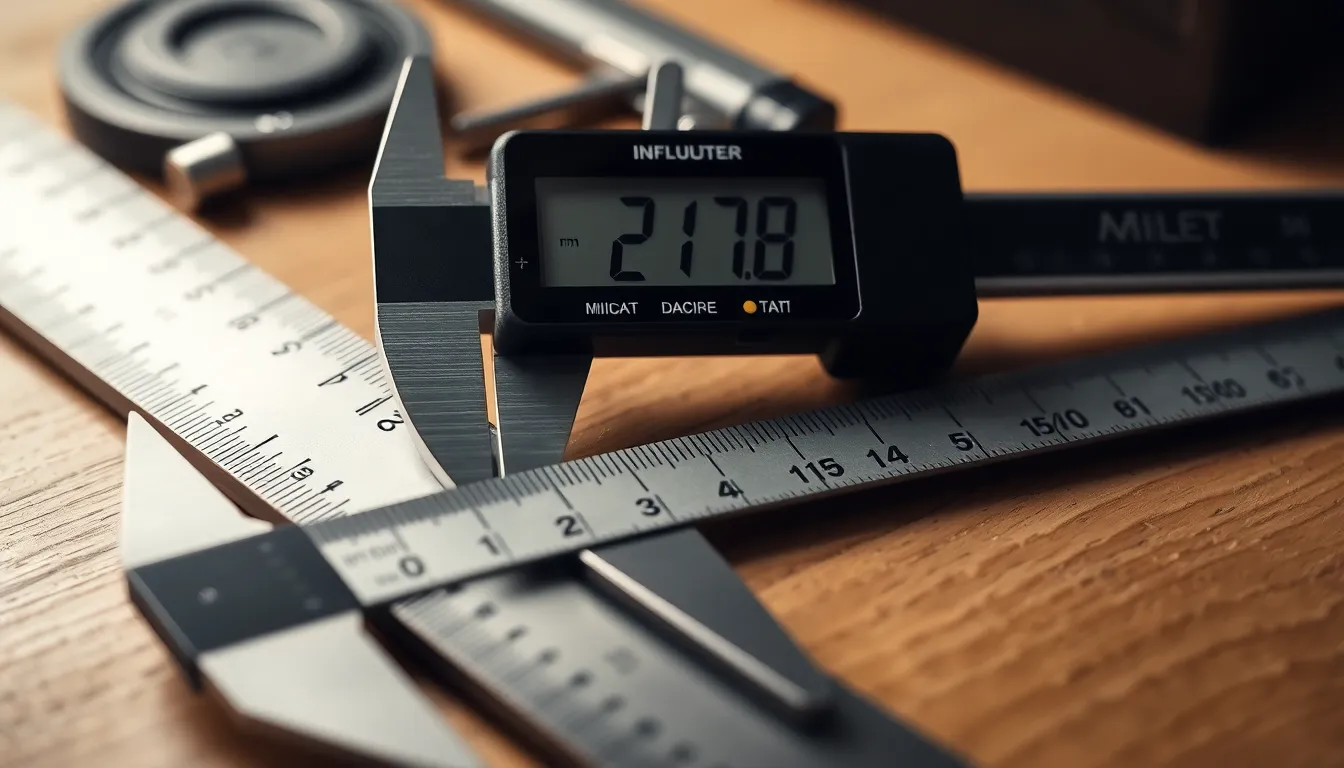Table of Contents
ToggleConverting measurements between inches and millimeters can be a common challenge, especially for those working in fields like construction, engineering, or design. Understanding how to accurately convert 2 1/8 inches to millimeters is essential for ensuring precision in any project.
Inches and millimeters are two widely used units of measurement, but they belong to different systems—imperial and metric, respectively. This article breaks down the conversion process, offering a clear understanding of how 2 1/8 inches translates into millimeters. Whether you’re a seasoned professional or a DIY enthusiast, mastering this conversion can enhance your accuracy and efficiency in various tasks.
Understanding Inches and Millimeters
Inches and millimeters represent two distinct measurement systems. Inches belong to the imperial system, while millimeters are part of the metric system. Understanding these units is crucial for precise conversions in fields such as construction, engineering, and design.
Inches provide a larger scale for measuring objects and spaces in the United States. Typical applications for inches include home dimensions, furniture measurements, and tool specifications.
Millimeters offer finer precision, often used in scientific contexts and international applications. Common applications for millimeters include mechanical parts, electronics, and medical equipment.
When converting inches to millimeters, the conversion factor is key. One inch equals 25.4 millimeters. Therefore, converting 2 1/8 inches involves a precise calculation:
- Step 1: Convert the fractional part: 1/8 inch equals 3.175 mm.
- Step 2: Add the whole inches: 2 inches equals 50.8 mm.
- Step 3: Combine both: 50.8 mm + 3.175 mm equals 53.975 mm.
Ultimately, knowing how to convert these measurements accurately enhances clarity and efficiency in various professional and DIY tasks.
Conversion Process of 2 1/8 Inches to mm

Converting 2 1/8 inches to millimeters involves a straightforward calculation using the conversion factor of 25.4 millimeters per inch. Understanding this process ensures accuracy in various professional applications.
Step-by-Step Calculation
- Identify the total inches: 2 1/8 inches can be expressed as a fraction. The fraction 1/8 equals 0.125. Thus, 2 1/8 inches is equal to 2.125 inches.
- Multiply by the conversion factor: To convert inches to millimeters, multiply by 25.4. Therefore, ( 2.125 times 25.4 = 53.975 ) millimeters.
- Result: The final result shows that 2 1/8 inches equals 53.975 millimeters.
Using Conversion Tools
- Online calculators: Utilize reliable online conversion tools for quick calculations. Websites like Metric-Conversions.org or CalculatorSoup.com provide instantaneous results for inches to millimeters.
- Mobile applications: Download conversion apps on smartphones. Apps such as “Unit Converter” or “ConvertPad” offer intuitive interfaces for converting measurements.
- Conversion charts: Refer to printed or digital conversion charts. These charts list common conversions, including inches to millimeters, assisting in faster reference.
- Spreadsheet software: Use Excel or Google Sheets for bulk conversions. With simple formulas, users can convert multiple values from inches to millimeters at once.
Practical Applications of 2 1/8 Inches to mm
Converting 2 1/8 inches to millimeters has several practical applications across various industries. Accurate conversion ensures consistency and precision in projects that rely on different measurement systems.
Common Uses in Different Industries
- Construction: Builders often require precise measurements for framing and installations. Converting 2 1/8 inches to 53.975 mm aids in ensuring proper fit for materials like lumber and fixtures.
- Engineering: Engineers use exact dimensions for components and assemblies. Understanding the metric equivalent allows for compatibility in international projects, where millimeters are standard.
- Design: Designers often integrate measurements into visual layouts. Accurate conversions help in creating prototypes that align with specified dimensions in both imperial and metric systems.
- Manufacturing: Manufacturers frequently convert measurements for machine settings and tooling specifications. Correct conversions can enhance production efficiency and reduce material waste.
Importance of Accurate Measurements
Accurate measurements matter significantly in various fields. Errors in size or scale can result in costly delays or rework.
- Safety: Precise dimensions are vital in construction where structural integrity is critical. Miscalculations can lead to unsafe conditions.
- Quality Assurance: Consistent measurements ensure the quality of finished products. This consistency fosters customer satisfaction and trust.
- Regulatory Compliance: Many industries require compliance with strict measurement standards. Accurate conversions help organizations meet regulatory requirements and avoid fines.
- Global Collaboration: In a globalized market, working with partners who use different units is common. Mastering conversions like 2 1/8 inches to mm promotes clear communication and efficient collaboration.
Comparison with Other Measurements
Understanding how 2 1/8 inches compares to other common dimensions provides context for its use across different applications.
Inches to Centimeters Conversion
One inch equals 2.54 centimeters. Thus, converting 2 1/8 inches gives:
- 2 1/8 inches = 2.125 inches
- 2.125 inches x 2.54 cm/inch = 5.398 cm
Feet to Millimeters
For larger measurements, converting feet to millimeters can be relevant. One foot equals 304.8 millimeters. For example:
- 1 foot = 304.8 mm
- Converting 2 1/8 inches (or 0.177083 feet) results in approximately 53.975 mm.
Relationship with Yards
The relationship between yards and millimeters also shows how these units interact. One yard equals 914.4 millimeters.
- 1 yard = 914.4 mm
- 2 1/8 inches is a small fraction of a yard, highlighting the convenience of using millimeters for precise measurements.
Comparison with Other Metric Units
Millimeters offer a finer scale than centimeters, making them useful in various precise applications.
- 1 centimeter = 10 millimeters
- Converting 2 1/8 inches results in 53.975 mm, which equates to 5.3975 centimeters.
These conversions illustrate the significance of millimeters in contexts requiring high accuracy, helping professionals choose the appropriate units for their specific needs.
Converting 2 1/8 inches to millimeters is more than just a simple calculation; it’s a vital skill for professionals across various industries. Mastering this conversion ensures accuracy and consistency in projects where precision is key. The tools available today make it easier than ever to perform these conversions quickly and reliably.
By understanding the relationship between inches and millimeters, individuals can avoid costly mistakes and enhance collaboration in a global marketplace. Whether in construction, engineering, or design, accurate measurements are essential for successful outcomes. Embracing this knowledge empowers professionals and DIY enthusiasts alike to navigate different measurement systems with confidence.






